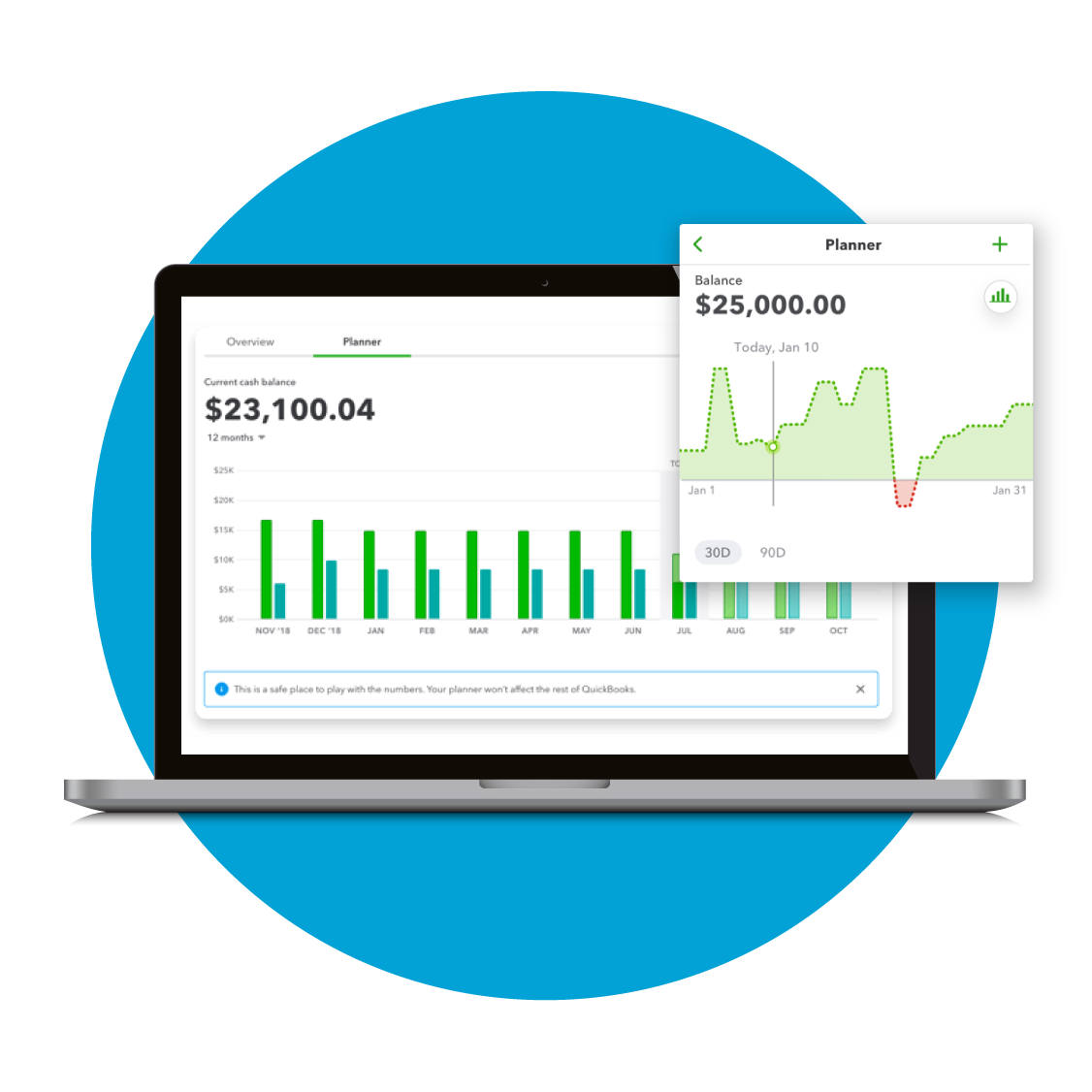
NetSuite Overview
NetSuite ERP is a solution providing tailor-made financial management to support enterprises at every growth stage. With its cloud-based, unified platform, real-time data, and customizable fields, NetSuite goes beyond just accounting. It offers a complete suite of business solutions, including CRM, e-commerce, HR management (HRMS), and professional services automation. With no need for added IT infrastructure, NetSuite delivers real-time business data efficiently.
NetSuite ERP is a comprehensive end-to-end accounting solution, enabling budgeting, integrated planning, seamless quote-to-order fulfillment, revenue management, and cash flow. Its functionalities reduce the need for additional headcount, making it a powerful tool to run your business.
QuickBooks Online Overview
Small businesses often favor QuickBooks due to its affordable price point. It offers basic bookkeeping features like generating financial reports and monitoring income and expenses. However, it remains strictly an accounting solution, needing more comprehensive functionalities for growing businesses.


QuickBooks Enterprise Overview
QuickBooks Enterprise remains primarily a desktop program with third-party hosting options for cloud access. However, this introduces management complexities and doesn't fully leverage the cloud's advantages. Manual inter-company transactions pose error risks.
The software must automate critical processes like multidimensional reporting, asset management, revenue recognition, and subscription billing. Users resort to multiple-point solutions, leading to inconsistent reports, manual re-work, and redundant processes.
Oracle NetSuite vs QuickBooks: A Feature Comparison
Understanding your business requirements is crucial to make the right choice between QuickBooks and NetSuite. If you aim to reduce operational costs, automate critical processes, and enhance productivity while ensuring scalability for the future, careful consideration of features and functionality is essential.
Evaluate the pros and cons of NetSuite and QuickBooks to determine which accounting solution aligns with your business’s growth and sustainability goals. The right choice will allow your business to adapt and thrive as you reach new heights seamlessly.
NetSuite and QuickBooks offer accounting software, but the depth of features sets them apart. Let’s explore their differences and how each platform caters to your current and long-term needs.
Oracle NetSuite vs QuickBooks: Tailored Solutions for Different Business Sizes
Both NetSuite and QuickBooks are renowned accounting software options, each excelling uniquely. But comparing QuickBooks vs NetSuite will show that the former suits small businesses with limited transactions, while NetSuite proves its strength in handling higher transaction volumes and scaling for larger enterprises.


General Ledger: Flexibility vs. Simplicity
Both platforms offer a general ledger to manage financial records. NetSuite stands out with greater flexibility and customization options, while QuickBooks takes a more uncomplicated and straightforward approach.
Cash Management: Comprehensive vs. User-friendly
NetSuite and QuickBooks both provide cash management features. NetSuite's tools offer real-time cash visibility and forecasting, whereas QuickBooks' tools offer ease of use for bank reconciliation.


Accounts Receivable: Automation vs. Simplicity
Both platforms handle accounts receivable. NetSuite excels with automation and customization for payment terms, billing, and collections. QuickBooks offers user-friendly invoicing tools.
Accounts Payable: Automation vs. Ease
NetSuite and QuickBooks cater to accounts payable needs. NetSuite's tools excel with automation, approval workflows, and multi-currency management. QuickBooks offers straightforward bill payment features.


Tax Management: Automation vs. Ease
Both platforms include tax management tools. NetSuite offers automation and customization, while QuickBooks provides simple tax calculation features.
Close Management: Streamlining the Process
NetSuite and QuickBooks aid in financial close management. However, delving deeper into comparing Oracle NetSuite vs Quickbooks shows that the former excels in automation and customization for period-end close and reporting, while QuickBooks offers user-friendly period-end tools.


Fixed Assets Management: Asset Tracking Made Easy
NetSuite offers fixed assets management, a feature absent in QuickBooks. It includes generating asset reports and monitoring asset values and depreciation.
Payment Management: Streamlined Payments
Both platforms provide payment management features. NetSuite's tools offer automation and multi-currency payment management, while QuickBooks offers user-friendly payment processing.

Time Tracking: Automate and Manage Employee Time
Both platforms support time tracking for employee hours and payroll. NetSuite's tools offer automation and customization for time-based workflows and project management.
Inventory Management: Efficient Inventory Tracking
Both platforms offer inventory management, allowing real-time tracking, purchase order management, and fulfillment. NetSuite excels with automation and multi-channel inventory management.

Cash Flow: Inflows and Outflows in Focus
For the cash flow feature in the Oracle NetSuite vs Quickbooks comparison, both platforms manage cash flow, project cash needs, and generate cash flow statements.
Project Profitability: Tracking Project Success
Both platforms enable project profitability tracking, with NetSuite offering automation and customization for project workflows and management.

Mileage Tracking: Manage Employee Expenses
NetSuite and QuickBooks support mileage tracking for expense reporting and tax purposes.
Payroll: Integrated vs. Third-party
Payroll is one feature that Quickbooks may have an upperhand in the comparison between QuickBooks vs NetSuite. QuickBooks offers built-in payroll. Unfortunately, NetSuite only permits integration with third-party payroll providers.


Workflow Automation: Streamlining Financial Tasks
Both platforms support workflow automation for repetitive accounting tasks and approval processes.
Batch Invoices and Expenses: Simplified Bulk Actions
QuickBooks facilitates batch invoicing and expense management, while NetSuite lacks these specific capabilities.


Pricing and Value: Comprehensive vs. Affordable
NetSuite offers advanced features with a higher price tag, including CRM, ERP, and e-commerce solutions. QuickBooks is much more affordable and offers different pricing plans for various business requirements.
Support and Ease of Use: Navigating the Software
NetSuite boasts powerful features with a steeper learning curve and offers ample customer support and training resources. QuickBooks shines with its user-friendly interface, making it ideal for beginners with extensive online support options.

Oracle NetSuite vs Quickbooks:
Why You Should Choose NetSuite
Comparing QuickBooks vs NetSuite shows that the latter is the ultimate winner. NetSuite is the most suitable enterprise resource planning (ERP) product, empowering your growing business to manage various operations under one platform efficiently. With NetSuite, you can seamlessly handle accounting, financial management, inventory, supply chain, and order management. Embracing NetSuite means real-time visibility into your financial performance, compliance with regulations, and enhanced profitability through proper inventory management.
Modules Designed to Empower Your Business
About the Author
Janine Motos
Editor
Janine has worked and written several blogs for Mustard Seed Systems Corporation as a Marketing Manager. This tech-savvy Website Admin now works as a Digital Innovations Lead, helping customers innovate and improve internal processes. She harnesses her IT expertise and power of words to drive transformative change for businesses of all sizes.








